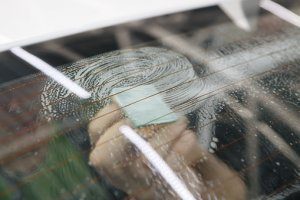A versatile product for your car, home or business
If you are searching for ways to cut down on your utility bill or interested in adding a layer of privacy to your car, home or office, applying window tint film is an affordable way to improve any interior space. Not only will window tint cut down on the distracting glare of the sun, it also reduces the amount of heat energy that penetrates a window. And while window tint promotes privacy, it allows for plenty of visibility. There are several types of tint film to choose from, so be sure to do your research before committing. This month, the auto-glass experts at Three Rivers Auto are comparing the choices available to consumers.
Cranberry Window Tint Film Options

- Dyed
- Metalized
- Carbon
- Ceramic
Dyed film, the film you see on many cars, is the most affordable type of window tint film on the market. It consists of a layer of dye and adhesive film applied to a window. Dyed film is more about appearance than functionality. The flat, opaque tint will prevent sunlight from totally penetrating the windows, however it doesn’t reduce the transfer of heat as effectively as others. And, like most things dyed, over time it will fade. Overall if you’re simply trying to reduce sunlight in your car, home or office, dyed film will do the job.
Metalized film is used, in many cases, for safety purposes. Each piece of film has an invisible layer of metallic particles embedded within, making the window more shatter-resistant. You can clearly see through the glass’s interior, and the appearance from the outside is shiny. While very reliable, metallized film is known to negatively impact cell phone and GPS transmission and radio reception.
Carbon film is a higher grade of window tint. It has a dark, matte-finish and can block up to 40% of the sun’s heat from entering your interior. During the winter months, carbon film also helps contain heat, therefore your furnace isn’t working overtime. It’s also effective in preventing furniture upholstery from fading and unlike it’s dyed counterpart, the film itself won’t fade either. Furthermore, it will not interfere with radio, cell or GPS transmissions like metalized tint.
Ceramic film is the crème de le crème of window-tinting applications. It’s the newest product on the market, the most expensive, but the most effective. Its qualities surpass the others starting with heat reduction. A ceramic film can block up to 50% of the sun’s heat and stops 99% of cancer-causing UV rays from penetrating your interior. Another safety feature is its near shatter-proof quality. Ceramic film is the most resistant to glare and fading, yet it’s incredibly transparent both day or night. With all of these qualities, it’s a product well-worth the cost.
If you’re interested in window tinting, please call Three Rivers Auto Glass and ask to speak with one of our auto glass repair experts. With six locations spread out across Greater Pittsburgh, we are minutes away from helping you make the best choice for your vehicle!
- How Pittsburgh’s Weather Affects Your ADAS Calibration - March 28, 2024
- Reasons You Should Replace Your Windshield with Insurance - February 23, 2024
- Exploring the Intersection of ADAS Technology and Pittsburgh’s Historic Roads - January 31, 2024


